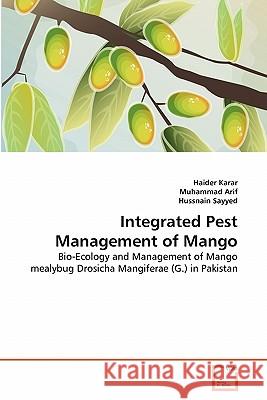Integrated Pest Management of Mango » książka
Integrated Pest Management of Mango
ISBN-13: 9783639328578 / Angielski / Miękka / 2011 / 216 str.
The study was conducted on bio-ecology and management of mango mealybug Drosicha mangiferae (Green) in mango orchards of Punjab Pakistan. It was found that the Chaunsa' cultivar was the most susceptible to mango mealybug followed by 'Fajri', 'Langra' and 'Black Chaunsa, whereas 'Dusehri' was resistant. Irrigation was the major source of flare up of the pest as viewed by the majority of the respondents. The practices like hoeing, ploughing, irrigation, removal of weeds, grease bands and insecticides were adapted by the respondents with variable results. With chemical analysis maximum carbohydrates contents were observed in the cultivar 'Chaunsa' (susceptible to the pest), whereas minimum carbohydrates contents were observed in the cultivar 'Tukhmi' resistant to the pest. The maximum decrease in number of fruits was recorded 11 percent on cultivar 'Anwar Ratul', whereas 'Langra' cultivar showed minimum decrease in number of fruits i.e., 3 percent over untreated trees.
The study was conducted on bio-ecology and management of mango mealybug Drosicha mangiferae (Green) in mango orchards of Punjab Pakistan. It was found that the Chaunsa cultivar was the most susceptible to mango mealybug followed by Fajri, Langra and Black Chaunsa, whereas Dusehri was resistant. Irrigation was the major source of flare up of the pest as viewed by the majority of the respondents. The practices like hoeing, ploughing, irrigation, removal of weeds, grease bands and insecticides were adapted by the respondents with variable results. With chemical analysis maximum carbohydrates contents were observed in the cultivar Chaunsa (susceptible to the pest), whereas minimum carbohydrates contents were observed in the cultivar Tukhmi resistant to the pest. The maximum decrease in number of fruits was recorded 11 percent on cultivar Anwar Ratul, whereas Langra cultivar showed minimum decrease in number of fruits i.e., 3 percent over untreated trees.











